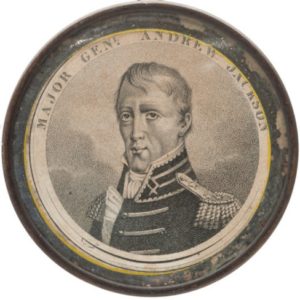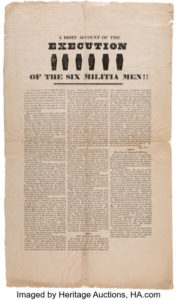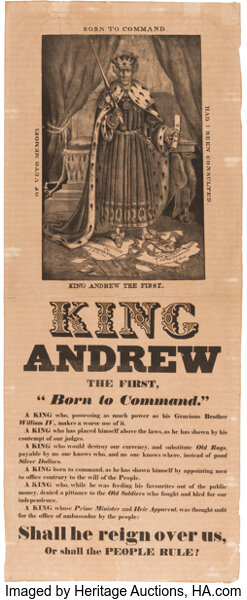Editor’s NOTE: It is rare that we publish a piece of this type, as it is in fact an advertisement for an upcoming auction – BUT – the links to various images are well worth looking at such pieces of history. ~ Ed.

One of the lessons many of us learned at an early age from Thumper in the Disney movie “Bambi” was, “If you don’t have somethin’ nice to say, don’t say nuthin’ at all.” Andrew Jackson is a president for whom it becomes challenging to say nice things! On the one hand, to admirers, he appears as a quintessential symbol of American accomplishment, the ultimate individualist praised for his strength and audacity. On the other hand, to his detractors, he appears vengeful, self-obsessed, a combatant and a tyrant, described in terms, at least prior to Donald J. Trump, as “coming closest to an American Caesar” as any president we have encountered.
Some of Andrew Jackson’s most significant impacts on our history as a nation include:
* Hero of the Battle of New Orleans – During the War of 1812, Jackson’s army of 5,000 men won a decisive battle against a British force of 7,500. The British suffered over 2,000 casualties compared to America’s 71.
* Seventh President of the United States – Jackson won two terms serving as President from March 4, 1829 to March 4, 1837.
* Resolving the Nullification Crisis – Some southern states, especially South Carolina, felt the Tariff of 1832 benefited northern industrialist states more than southern farmers. This ignited a major crisis in which South Carolina threatened to leave the union and pass legislation nullifying the federal law. Jackson reacted by signing both the Force Bill, which authorized the use of military force to enforce the tariff, and the Compromise Tariff of 1833, which included provisions to gradually reduce tax rates mandated by the Tariff of 1832. The Compromise Tariff bill averted the crisis without the need to implement the Force Bill.
* Jacksonian Democracy – Jackson is credited for having created a political movement to provide greater democracy for the common man. Prior to Jackson’s presidency, the right to vote was reserved for only wealthy white male property-holding taxpayers. Under his administration, attitudes and state laws changed in favor of granting the right to vote to all white males.
* The Trail of Tears – In 1830, Jackson signed into law the most controversial legislation of his presidency, the Indian Removal Act. The law authorized him to relocate tens of thousands of Native Americans from their lands in the southeastern US to federal territory west of the Mississippi. The move was supposed to be voluntary and, in Jackson’s words, giving “humane and considerate attention to the rights and wants of the Indian tribes.” It proved to be anything but that. At the end of Jackson’s administration in 1837, the Seminole Indians went to war rather than leave their homes. Their struggle lasted seven costly years. No treaty was signed with the Creeks in Alabama, so the Secretary of War sent General Winfield Scott to rout them off their land. Scott then rounded up sixteen thousand Cherokee forcing them to move west. Between four thousand and ten thousand Native Americans died on the ‘Trail of Tears.’
 The Indian Removal Act resulting in the ‘Trail of Tears’ is perhaps the most famously criticized action attributed to Andrew Jackson. However, there were other notable cruelties to impact his legacy. Jackson championed the traditions of the slave-holding South and was an advocate for its expansion westward. Jackson himself traded slaves and, in the 1820s, personally owned more than 100.
The Indian Removal Act resulting in the ‘Trail of Tears’ is perhaps the most famously criticized action attributed to Andrew Jackson. However, there were other notable cruelties to impact his legacy. Jackson championed the traditions of the slave-holding South and was an advocate for its expansion westward. Jackson himself traded slaves and, in the 1820s, personally owned more than 100.
In February 1815, six militiamen under Major General Andrew Jackson’s command were court-martialed for insubordination and later executed. Because Jackson did not prevent their execution, he was accused of murder thirteen years later by supporters of incumbent President John Quincy Adams when he ran against him for President in 1828. There were a series of famous broadsides depicting six coffins with the names and stories of the six militiamen. Our Americana and Political Signature® Auction on June 11 features one of these macabre “coffin broadsides,” which is as notable an example of vicious politicking as any derogatory contrivance used by candidates today in our political election process.
 Another example of Anti-Jackson sentiment in our June auction is the supremely rare and coveted “King Andrew the First” broadside. It portrays Jackson as a despotic monarch wildly charging him with numerous offenses, taking aim in particular at a presidential order in the fall of 1833 to remove federal deposits from the Bank of the United States. The president was strongly criticized for acting without the approval of Congress when he vetoed a congressional bill to recharter the Bank in July 1832. In regal costume, “King Andrew” stands with the US Constitution and the arms of Pennsylvania (the National Bank was in Philadelphia) lying in pieces at his feet. There are fewer than a dozen known examples of this remarkable broadside extant. Certainly, a prized item within the collections of those lucky few!
Another example of Anti-Jackson sentiment in our June auction is the supremely rare and coveted “King Andrew the First” broadside. It portrays Jackson as a despotic monarch wildly charging him with numerous offenses, taking aim in particular at a presidential order in the fall of 1833 to remove federal deposits from the Bank of the United States. The president was strongly criticized for acting without the approval of Congress when he vetoed a congressional bill to recharter the Bank in July 1832. In regal costume, “King Andrew” stands with the US Constitution and the arms of Pennsylvania (the National Bank was in Philadelphia) lying in pieces at his feet. There are fewer than a dozen known examples of this remarkable broadside extant. Certainly, a prized item within the collections of those lucky few!
Jackson was the first president to have endured an attempted assassination when two derringers possessed by a mentally deranged individual misfired. Jackson was leaving a congressional meeting at the Capitol building when the attacker, an unemployed housepainter named Richard Lawrence, shot at him. The gun misfired, and a furious Jackson, then 67 years old, assailed his attacker with his walking stick! During the struggle, Lawrence pulled out another gun, and it too misfired. A century later, when both derringers were tested by the Smithsonian Institute, both guns discharged properly on the first try. It was later determined that the odds of both guns misfiring during the assassination attempt were one in 125,000.
Despite passionate debate on both sides weighing his virtues and vices, Jackson’s impact on our history remains undeniable, just as his portrait remains on the US twenty-dollar bill. For serious Americana collectors, tangible records of so significant a president are high on the wantlists. The legacy of Andrew Jackson is a complicated one leaving scholars and collectors with much fodder to debate over and study, even today.
Written by Ray Farina for Heritage Auctions for an upcoming auction of historical images and documents. ~ March 24, 2022
